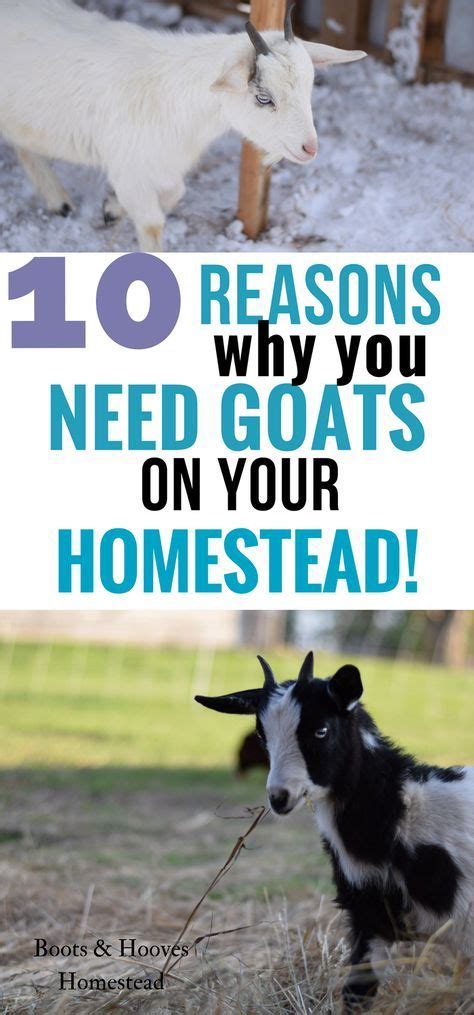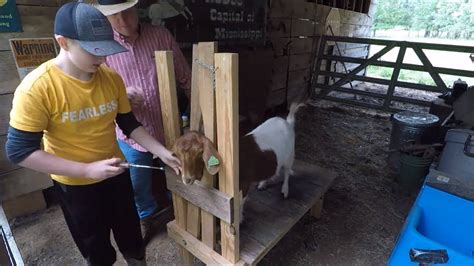Are you yearning to escape the monotony of city life and embrace an enchanting existence in the heart of the countryside? Look no further, for we have the key to unlocking your rural reveries – a cherished caprine companion! Imagine the joy of waking up to the gentle bleating of a contented goat, the soothing rhythm of their hooves as they graze peacefully on lush green meadows. In this comprehensive handbook, we will guide you through the process of transforming your dreams into reality, providing invaluable insights into the intricate art of selecting and caring for your very own caprine addition to your idyllic farmstead.
Delving into the world of caprine ownership requires a deep understanding and appreciation for the boundless rewards that come with such a venture. As you embark on this transformative journey, may this guide serve as your compass, illuminating the path towards a harmonious existence alongside these charismatic creatures. From choosing the perfect breed that aligns with your desires and requirements, to providing a nurturing environment for both their physical and emotional well-being, we leave no stone unturned in equipping you with the knowledge necessary to establish a lasting bond with your caprine companion.
Ensuring the well-being and longevity of your goat requires careful consideration of their nutrition, health, and overall welfare. Our expert tips, garnered from experienced farmers and seasoned enthusiasts, will empower you to confidently navigate the intricate art of providing adequate nutrition and shelter, keeping your caprine confidant free from disease and pests, and establishing a routine that fosters trust and contentment. With a little patience, dedication, and an unwavering commitment to your goat's welfare, you can create a haven where their happiness knows no bounds.
Advantages of Owning a Goat on Your Homestead

One compelling reason for considering the addition of a goat to your homestead is the plethora of benefits that come along with it. From enhancing sustainability to providing valuable resources, goats can play a pivotal role in improving your homesteading experience.
Firstly, goats are renowned for their ability to graze on various types of vegetation. This unique feeding behavior allows them to efficiently control weed growth, reducing the need for manual labor or chemical herbicides. Additionally, their browsing habits help maintain a diverse and healthy ecosystem on your farmstead.
Apart from their weed management skills, goats are also excellent companions for other farm animals. Their gentle and sociable nature make them ideal partners for horses, chickens, and other livestock. Goats can provide a sense of comfort and security to their animal counterparts, fostering a harmonious and balanced environment on your homestead.
The benefits of owning a goat extend beyond the realm of vegetation and animal companionship. These intelligent creatures also offer a variety of valuable resources. Goat milk, for example, is highly nutritious and can be used to make a range of dairy products such as cheese, yogurt, and soap. Additionally, their soft and warm fleece can be spun into yarn, offering opportunities for craft and textile enthusiasts.
Furthermore, goats are incredibly adaptable and require minimal space and resources to thrive. They can comfortably reside in small enclosures and their diet consists of inexpensive forage and hay, reducing the overall cost of their upkeep. Moreover, their self-sufficient nature makes them an attractive choice for homesteaders seeking a low-maintenance animal that still provides a multitude of benefits.
In conclusion, the advantages of owning a goat on your homestead are vast and diverse. From their natural weed control abilities to their compatibility with other farm animals, goats contribute to a holistic and sustainable farming experience. So consider the valuable resources, companionship, and cost-effectiveness that goats bring, and take a step towards enhancing your homesteading journey.
Choosing the Perfect Goat Breed for Your Homestead
When it comes to creating your ideal homestead, selecting the right goat breed is a crucial decision that will impact the success of your farmstead. Each goat breed possesses unique characteristics, such as size, temperament, milk production, and adaptability to various climates. It is essential to understand these factors before making a choice, as they will ensure the harmonious integration of your goats into your farmstead lifestyle.
| Breed | Size | Temperament | Milk Production | Adaptability |
|---|---|---|---|---|
| LaMancha | Medium | Calme | Excellent | Adaptable to various climates |
| Nubian | Large | Friendly | High | May require shade in hot climates |
| Alpine | Medium to Large | Energetic | Good | Can adapt to different environments |
| Saanen | Large | Gentle | High | Not suitable for extremely hot climates |
| Toggenburg | Medium to Large | Inquisitive | Good | Excel in cooler climates |
These examples represent only a few of the many goat breeds available, each with their specific attributes. While size and temperament are essential considerations, you should also evaluate milk production capacity based on your dairy needs. Additionally, consider your farm's climate and the breed's adaptability to ensure their overall wellbeing.
Ultimately, choosing the right breed of goats for your farmstead involves aligning their characteristics and needs with your lifestyle and goals. By understanding the various breeds and their traits, you can make an informed decision and begin fulfilling your farmstead dream with these delightful animals.
Setting Up Adequate Housing and Fencing for Your Caprine Companions

In this section, we will delve into the crucial aspects of providing appropriate housing and secure fencing for your newfound caprine companions. Ensuring the well-being, safety, and happiness of your goats starts with providing them with a suitable living environment. Proper housing and fencing are vital components of goat care and play integral roles in maintaining their health and protecting them from external risks.
Housing:
When it comes to housing your goats, it is important to prioritize their comfort and safety. A well-designed goat shelter should protect them from harsh weather conditions such as extreme heat, cold, wind, and rain. It should also offer adequate ventilation to prevent the buildup of moisture and ammonia, which can negatively impact their respiratory health.
Consider constructing a sturdy and spacious shelter that allows for easy movement and maneuvering. Provide proper insulation to regulate temperature fluctuations, and ensure that the flooring is easy to clean and offers good drainage to prevent the accumulation of waste.
Remember: A happy and healthy goat is a goat that feels secure and protected in its housing!
Fencing:
Securing proper fencing for your goats is crucial to keep them safely within their designated boundaries and protect them from potential threats. Goats are known for their agile and curious nature, which means they are quite adept at finding ways to escape if fencing is not adequately designed.
Consider installing a fencing system that is at least four to five feet high and made from sturdy materials such as woven wire, chain link, or livestock panels. Make sure that the gaps between the fence rails are small enough to prevent your goats from getting their heads or hooves stuck. Additionally, it is essential to regularly inspect and maintain the fencing to ensure there are no weak areas or holes that could compromise their security.
Tip: Plan your fencing system considering both the size and behavior of your goats, and remember that a well-secured fence is the cornerstone of goat husbandry!
Feeding and Nutrition: Vital Tips for Maintaining Optimal Health in Your Caprine Companions
When it comes to ensuring the well-being of your caprine companions, proper feeding and nutrition play a pivotal role. A balanced diet is not only essential for maintaining overall health, but it also supports the goats' ability to resist diseases, enhance growth, and achieve optimal performance. In this section, we will explore some indispensable tips and guidelines to help you make informed decisions regarding the dietary needs of your goats, paving the way for a healthy and thriving herd.
- Understanding the Basics: Before delving into specific dietary requirements, it is crucial to grasp the fundamental principles of goat nutrition. Goats are ruminants with complex digestive systems, relying on a diet primarily composed of forages such as grasses, leaves, and shrubs. Supplementing their forage intake with grains, minerals, vitamins, and water is essential to meet their nutritional needs.
- Forage Selection: The foundation of your goats' diet should revolve around quality forage. Ensure access to a diverse range of forage options, including grass, legumes, and browse. Rotating pastures and incorporating forage testing can help assess the nutritional content and suitability for your goats' specific needs.
- Grain Feeding: While forage is the primary component of a goat's diet, grains can be provided as supplementary feed. It is important to remember that grains should never exceed more than 10-15% of their total diet. Choose high-quality grains and gradually introduce them to avoid digestive issues such as bloat or acidosis.
- Minerals and Vitamins: A well-balanced mineral supplement is crucial to meet your goats' micronutrient requirements. Consult with a veterinarian or livestock nutritionist to determine the appropriate mineral mix for your specific region and herd. Additionally, consider providing vitamin supplements, particularly vitamin A and E, to support their immune system and overall health.
- Water Management: Adequate access to clean, fresh water is essential for promoting proper digestion and overall health. Make sure water sources are easily accessible and regularly cleaned to prevent contamination or stagnation.
- Feeding Practices: Establishing consistent feeding practices, such as scheduled feeding times and appropriate portion sizes, helps maintain a healthy weight and prevents overeating or underfeeding. Avoid sudden changes in diet, as it can lead to digestive disturbances. Monitoring body condition scores can provide valuable insights into the effectiveness of your feeding program.
- Considerations for Special Cases: Certain situations, such as breeding, lactation, or health conditions, may require additional dietary considerations. Consult with experts, such as veterinarians or specialized goat nutritionists, to develop a tailored feeding plan that meets the specific needs of your goats during these critical periods.
By following these essential feeding and nutrition tips, you can ensure that your goats receive the proper nourishment they need to thrive. Remember, a well-fed and healthy goat is not only happier but also more productive in supporting your farmstead goals.
Goat Care and Health Maintenance: Vaccinations, Deworming, and Hoof Trimming

Ensuring the well-being and health of your goats is essential to maintaining a thriving farmstead. This section focuses on the key aspects of goat care, including vaccinations, deworming, and hoof trimming.
Vaccinations play a crucial role in safeguarding your goats against various diseases. Regular immunizations help prevent the spread of contagious illnesses and protect the overall health of your herd. Some common vaccines for goats include tetanus, clostridium perfringens types C and D, and caseous lymphadenitis. It is important to work closely with a veterinarian to determine the appropriate vaccination schedule for your goats based on their age, location, and potential exposure risks.
Deworming is another vital aspect of goat care. Internal parasites, such as worms, can significantly impact the health and productivity of your goats. Regular deworming helps control parasite infestations and prevent potential complications. There are various deworming medications available, including oral pastes, powders, and injectables. It is advisable to consult with a veterinarian to establish an effective deworming protocol tailored to your goats' specific needs.
Hoof trimming is an essential part of maintaining the overall well-being of your goats. Overgrown hooves can lead to discomfort, lameness, and even long-term health issues. Regular hoof trimming ensures proper weight distribution and prevents problems associated with uneven or misaligned hooves. It is recommended to learn the correct techniques for trimming goat hooves or seek professional assistance to avoid causing injury. Trimming frequency may vary depending on the goat's environment, hoof growth rate, and individual hoof condition.
- Regular vaccinations are crucial to protect your goats from diseases such as tetanus, clostridium perfringens, and caseous lymphadenitis.
- Deworming helps control internal parasites and maintains the health and productivity of your goats.
- Hoof trimming prevents lameness and ensures the proper weight distribution in your goats.
- Consulting with a veterinarian is essential for establishing the appropriate vaccination schedule and deworming protocol for your goats.
- Learn proper hoof trimming techniques or seek professional assistance to promote the well-being of your goats.
By prioritizing vaccinations, deworming, and hoof trimming, you can ensure the longevity and vitality of your goat herd, allowing you to fully enjoy the benefits of your farmstead.
FAQ
What are the benefits of purchasing a goat for your farm?
Purchasing a goat for your farm can provide numerous benefits. Goats are excellent grazers and can help maintain the vegetation by eating weeds and brush. They also produce high-quality milk, which can be used for making cheese and other dairy products. Additionally, goats can serve as companions for other animals on the farm and can even be used for sustainable meat production.
What are the common considerations when choosing a breed of goat?
When choosing a breed of goat, several factors should be taken into consideration. First, assess the purpose of purchasing a goat - whether it is for milk, meat, or as a pet. Then, consider the climate of your farmstead and select a breed that is well-suited to the local weather conditions. Other factors to consider include the size of the goat, its temperament, and its feeding requirements.
What type of shelter and fencing is necessary for goats?
Providing suitable shelter and fencing is essential for goats. They require a secure enclosure with sturdy fencing to prevent any potential predators from entering the premises and to keep the goats from straying. The shelter should be well-ventilated, dry, and spacious enough to accommodate the goats comfortably. It should also have proper bedding and protection from extreme weather conditions such as excessive heat or cold.
What are the key factors to consider in maintaining the health of your goats?
Maintaining the health of your goats involves several key factors. Firstly, ensure a well-balanced diet for them, which includes a combination of hay, grains, fresh water, and mineral supplements. Regular veterinary care, including vaccinations and deworming, is also vital. Provide proper sanitation in their living area to prevent the spread of diseases. Additionally, regular exercise and providing mental stimulation are important for their overall well-being.
Is it necessary to have prior experience in raising goats before purchasing one?
While prior experience in raising goats can be beneficial, it is not an absolute requirement. However, it is essential to educate yourself about goat care, health, and nutrition before bringing one to your farmstead. There are numerous resources available, such as books, online forums, and local agricultural extension offices, that can provide valuable information and guidance in successfully raising goats.
How can I fulfill my farmstead fantasy of purchasing a goat?
To fulfill your farmstead fantasy of purchasing a goat, you need to start by considering your goals and requirements. Decide what type of goat you want, whether it's for milk production, meat, or simply as a pet. Research different breeds to determine the best fit for your needs. Then, find a reputable breeder or rescue organization to purchase the goat from. Make sure to provide a suitable enclosure, proper nutrition, and any necessary veterinary care. Taking these steps will help you fulfill your dream of owning a goat.
What are the different considerations when choosing what type of goat to purchase?
There are several factors to consider when choosing what type of goat to purchase. Firstly, determine your purpose for getting a goat. If you want milk, then a dairy breed like Alpine, Saanen, or Nubian would be suitable. If you are interested in meat production, then Boer or Kiko goats are ideal choices. If you simply want a pet, then a miniature breed like Nigerian Dwarf or Pygmy goats may be more suitable. Additionally, consider the climate and environment of your farm, as some goat breeds are better suited to certain conditions. Finally, think about the space and resources you have available for the goat's care and maintenance.



